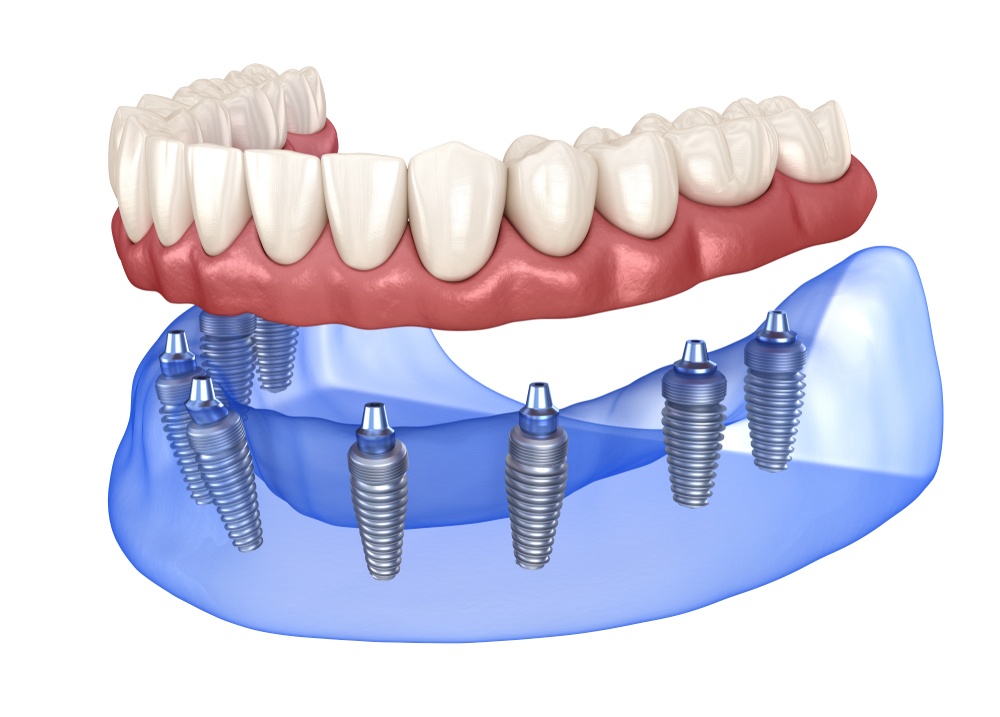Dentures have been a technology that human civilization has crafted dating back to 700 BC, courtesy of the Etruscans. In the 1700s, dentures switched from ivory to porcelain and, later, acrylic teeth, but the basic recipe stayed the same. One must use different types of material close to the consistency of enamel to create a representation of an enamel toot. This was the existence of dental replacement until 1965, when the first dental implants were created using titanium. This leap led to a much more comprehensive yet much better way to administer dental replacement.
Implant-Retained dentures are a modern invention that marries the two. Implant-Retained Dentures are a revolutionary technology that combines some elements of dental implants with a less expensive adhesive combination similar to the traditional dentures. This combination delivers a “best of both worlds” solution to dental replacement.
The historical gold standard for dental replacement is Full Arch Dental implants, but those can cost any patient a pretty penny, to say the least. Without implant attachments, it can lead to annoying side effects such as an inability to speak properly, the consistent displacement of the dentures in the mouth, and a reduced ability to chew food. Implant-Retained Dentures are symbiotic phenomena between the two original dental replacement routes that resulted from multiple experiments and modern technology.
What Are the Benefits of Implant-Retained Dentures?
No Adhesives and Chemicals – The structure of implant-retained dentures allows for a seamlessly fitting without the addition of unwanted adhesives and chemicals. This will enable individuals who might be sensitive or have allergies to certain chemicals to avoid dealing with this.
Perfectly Still – Traditional Dentures have a habit of moving around. Implant-retained dentures will never move around because of the unique connection method.
Ability to Chew Food – With implant-repaired dentures, you regain the power to chew food, especially compared to traditional dentures without implants.
Better Speach and Confidence – Many agree that one of the most prevalent adverse effects of traditional dentures is that some cannot speak and annunciate words correctly. The implant and screwing aspect allows the implant-retained dentures to be much closer to natural teeth letting speech flow naturally.
Money in the Pocket – Not only do implant-retained dentures encompass a less invasive option than full arch dental implants, but it’s also much more economical as well! Typically you will be looking at 15-20% of the price of implant-supported dentures or full-arch implant restoration.
Minimally Invasive Surgery- For those afraid to “go under the knife,” implant-retained dentures surgery is minimal. Unlike dental implants, the surgery is light and might only include a few teeth instead ofo the full arch dental implant surgery, which comprises all teeth.
Is Surgery Involved?
Yes, there are two separate surgeries involved, but none are too invasive. Implant-Retained Dentures are much less invasive than full arch dental implants. In most cases, the surgeon will insert titanium screws into the patient’s jawbone. Then they will give the screws ample time to meld with the jawbone tissue. This “osseointegration” can take up to 6 months but is typically around four and a half months.
Once the osseointegration is complete, the surgeon will then attach dentures that fit precisely to the implants. This combination saves the patient surgical time and money while providing a solution similar to the robustness of Full Arch Dental Implants. Once these dentures are attached to the implants, they are fitted via attachments to stay, eliminating the messy adhesive and chemical risk one might find with traditional dentures.
How Much Do Implant-Retained Dentures Cost?
Implant-retained dentures costs vary on the scope of work. Full Arch Dental Implants will cost upwards of $40,000, so implant-retained dentures offer a much less expensive alternative. Sometimes the implants can be added to existing dentures to further reduce the cost.
Does Dental Insurance Cover Implant-Retained Dentures
Most insurances will cover part of traditional dental implant costs. However, currently, most insurances will not cover the majority of implant-retained dentures because of new technology. However, some insurance companies recently have approved the procedure. As time progresses, we expect more insurance companies to contribute towards implant-retained dentures.

